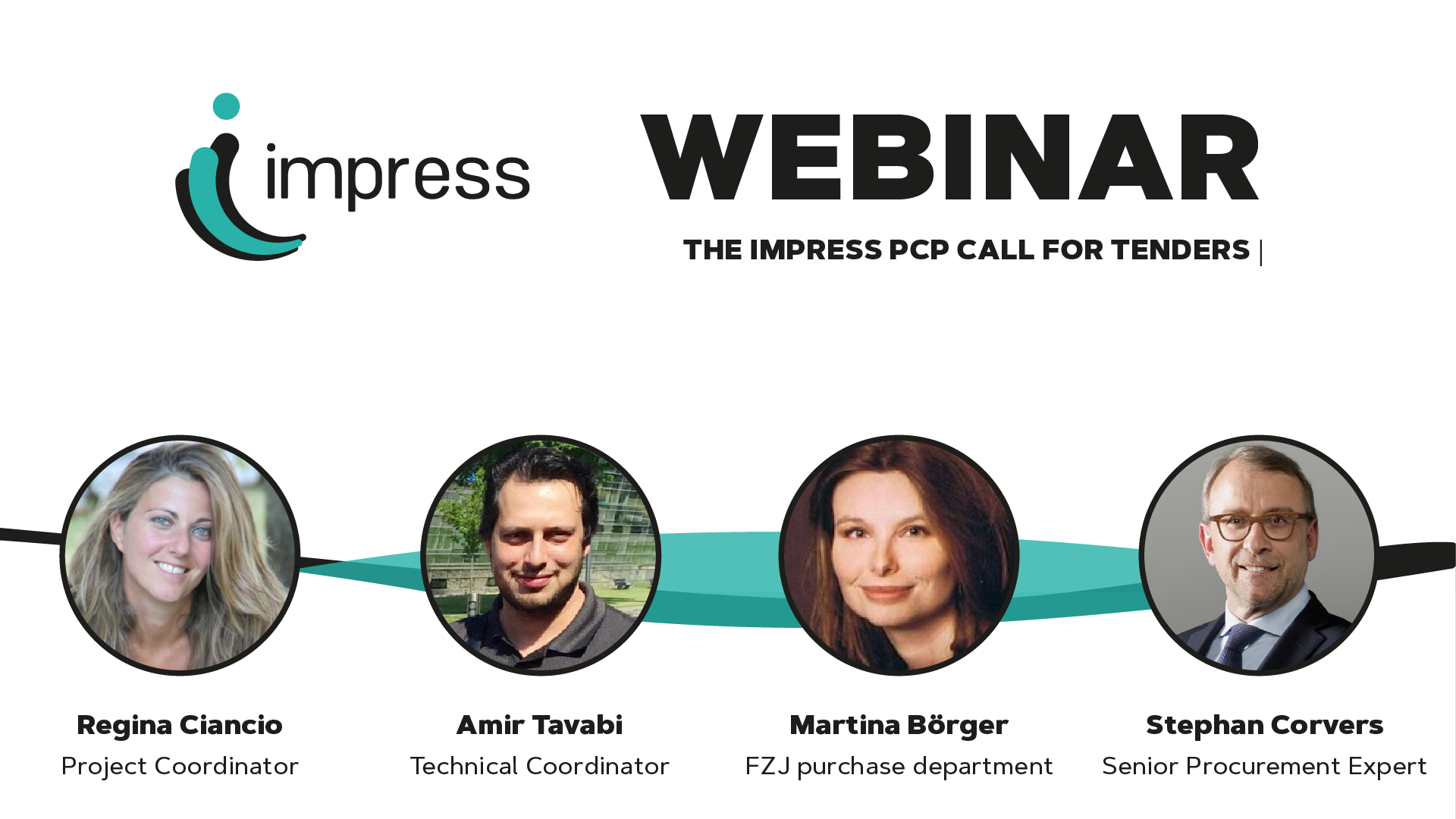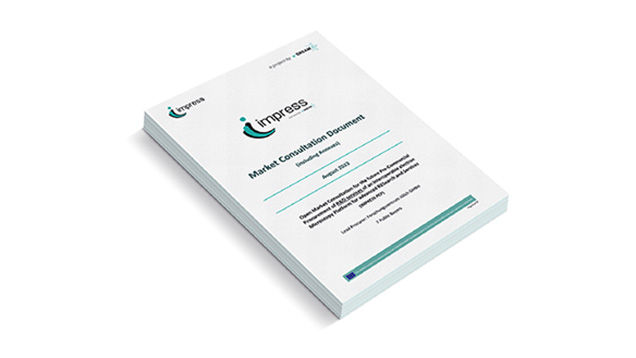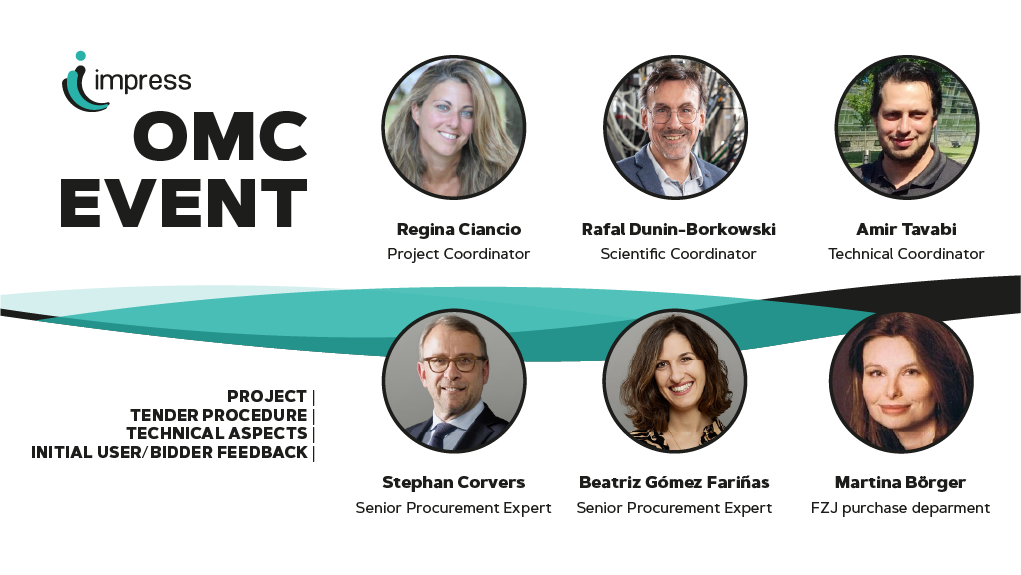Pre-Commercial Procurement
- Home
- »
- PCP
The IMPRESS PCP Call for Tenders is closed.
Leverage the PCP to expand the horizon of TEM.
IMPRESS aims to expand the horizon of TEM by developing a cartridge-based interoperable platform:
- to customize TEM components to fit smoothly along the microscope column and across manufacturers;
- to seamlessly integrate TEM components with a wide spectrum of instruments across different sectors;
- to make TEMs flexible and adaptable to a diversity of multimodal experiments.
Innovative solutions will be developed with companies selected through a Pre-Commercial Procurement (PCP). The PCP is a demand-side approach aimed at advancing R&D services and stimulating innovation. The process is composed of 3 phases: 1 solution design, 2 prototype implementation, 3 validation and demonstration. Winning companies will have unique advantages in addressing global markets and attracting business opportunities.
The PCP Tender at a glance.
Explore our suite of resources specifically designed to gather crucial information and insights into the IMPRESS PCP Call for Tenders.
This suite includes an informative webinar and two brief documents that offer an overview of the IMPRESS PCP and the tender contents.
How to participate
These four short video tutorials show you how to optimize the tender process with our step-by-step instructions.
- How to register on Subreport
- How to download the tender documents
- How to communicate with the procurer
- How to submit your bid

Drive the future of TEM!
The IMPRESS PCP Call for Tenders is closed.
The PCP process will allow companies with diverse scientific and technological expertise to join forces with IMPRESS to develop the novel cartridge-based interoperable platform.

Matchmaking tool.
Would you like to participate in the tender in partnership with other companies to maximize your ability to meet the IMPRESS PCP requirements?
Find potential partners through our Matchmaking platform by starting with a simple form!
Your profile will be included in the list below to enhance visibility for other companies actively seeking partnership opportunities.
Check the profiles of other companies that have completed the form and find your match!

The PCP timeline. 4 easy steps.
IMPRESS follows the stages of the pre-commercial procurement process
as laid-out by the European Commission.
-
PREPARATORY PHASE
February-December 2023|
TENDER
January-April 2024Based on the preparatory phase and the Open Market Consultation (OMC)
-
PREPARATORY PHASE
February-December 2023|
TENDER
January-April 2024Based on the preparatory phase and the Open Market Consultation (OMC)
-
PHASE 1 | SOLUTION DESIGN
June-October 2024Selected companies will design solutions for the interoperable platform and verify their technical and economic feasibility
-
SOLUTION DESIGN
Phase 1 - June-OCtober 2024Selected companies will design solutions for the interoperable platform and verify their technical and economic feasibility
-
PHASE 2 | PROTOTYPE IMPLEMENTATION
December 2024-July 2025
First prototypes will be developed by the companies and tested at FZ Juelich
-
PROTOTYPE IMPLEMENTATION
Phase 2 - December 2024-July 2025
First prototypes will be developed by the companies and tested at FZ Juelich
-
VALIDATION AND DEMONSTRATION OF SOLUTIONS
Phase 3 - September 2025-May 2026
Final prototypes will be tested and validated in operational environments
-
PHASE 3 | VALIDATION AND DEMONSTRATION OF SOLUTIONS
September 2025-May 2026
Final prototypes will be tested and validated in operational environments
Q&A. Our answers to your specific questions.
Final Q&A list compiled during the PCP Tendering phase
DISCLAIMER: This list is solely published for the purpose of answering the questions posed by technology providers during the tendering phase. Please note that only the official information contained in the tender documents and this final Q&A list is legally binding. In case of conflict between the provisions of this Q&A list and the tender documents, the content of the tender documents shall prevail (with the exception of the answer to question 13). Technology providers are responsible to ensure that their bids are fully compliant with the provisions of the tender documents.
General Questions
If a contractor does not reach the specified milestones during each phase within the agreed timeframe, their performance shall be regarded as non-satisfactory. This means that the contractor will not receive the full payment allocated for that phase, but will only be paid for the part of the work that has been completed. The Procurement Technical Committee will decide if the contractor needs to reimburse the pre-payment, or part of it, to the Public Buyers Group.
This does not apply in the case of unforeseen circumstances beyond the parties’ control (force majeure). The contractor must formally notify such a situation to the contracting authority without delay, stating the nature, likely duration and foreseeable effects.
For more information, please read section 5.2 of the Call for Tenders (TD1) and Articles 21.15 and 25 of the Framework Agreement (TD10).
Bids need to comply with the requirements and technical specifications detailed in the Call for Tenders (TD1). The “at least two” criterion is a minimum requirement. The consequence of non-compliance is rejection of the bid.
Payments corresponding to each Pre-Commercial Procurement phase will be subject to “satisfactory completion” of the deliverables and milestones for that phase. Satisfactory completion will be assessed by the Procurement Technical Committee, which is composed of members of the Public Buyers Group.
“Satisfactory completion” will be assessed based on the following criteria:
• If the work corresponding to that milestone/deliverable has been carried out.
• If a reasonable minimum quality has been delivered.
• If reports have been submitted on time.
• If the funding has been allocated to the planned objectives.
• If the funding has been allocated and the work has been carried out according to the pass/fail award criteria (place of performance, public funding and R&D definition criteria).
• If the work has been carried out in compliance with the provisions of the Contract (including, in particular, verification of whether the contractor has duly protected and managed the Intellectual Property Rights generated during the respective phase).
In case of non-satisfactory completion, the Procurement Technical Committee will decide on the amount of money to be paid to the contractor (based on the part of the work that has been completed) and on whether the pre-payment (or part of it) needs to be reimbursed to the Public Buyers Group.
For more information, please read section 5.2 of the Call for Tenders (TD1) and Article 21.15 of the Framework Agreement (TD10).
The costs covered by the Pre-Commercial Procurement are indicated in the Financial Offer & Cost Breakdown template (TD3). These costs include R&D costs and non-R&D costs. The non-R&D costs must be less than 50% of the total costs.
For more information, please read section 4.6 of the Call for Tenders (TD1).
Technology providers have the possibility to patent the results that they generate during the Pre-Commercial Procurement, provided that they comply with the open hardware and open software requirements, as defined in Use Case 1. Please see Annex 2 of the Call for Tenders (TD1).
Nevertheless, technology providers are encouraged towards an open innovation approach. Waiving of Intellectual Property Rights and a commitment not to file patent applications will be evaluated positively as part of the award criteria. Please see section 3.5 of the Call for Tenders (TD1).
During execution of the Pre-Commercial Procurement, the Public Buyers Group will have the right to use the project’s Intellectual Property Rights, relevant background Intellectual Property and results related to the design specifications developed by the contractor non-commercially. Non-commercial means that members of the Public Buyers Group cannot commercialise the Pre-Commercial Procurement results.
However, members of the Public Buyers Group retain the right to use the results of the Pre-Commercial Procurement to evaluate and test the Pre-Commercial Procurement results, as stated in Article 8.7 of the Framework Agreement:
The Contractor grants the PBG a full and unrestricted right for free to access these Results, for the duration of the PCP for monitoring and evaluation purposes (with the necessary guarantees of confidentiality) of the IMPRESS project.
For more information, please read Article 8 of the Framework Agreement (TD10).
The requirements that are outlined in the Pre-Commercial Procurement documentation (i.e., the tender documents) concern all Work Packages, not only Work Package 5.
The requirements were defined to meet the needs of the activities of all of the Work Packages, which will run in parallel. The common underlying elements for all of the Work Packages are the standardized interface and cartridge concept, which should be designed to incorporate all of the functionalities of the project's Work Packages. Software, automation and control are linked in a similar way to the hardware development of the prototypes.
Technical Questions
[second part of the question] Considering that even with such a universal interface between the cartridge and holder, several holder geometries will still be needed to fit into different ports on the column or into different columns. This combined with the expectation that no experiment will require all 6 functionalities simultaneously; would it not make more sense to have a range of “open” interfaces for specific useful combinations of functionalities?
ANSWER: A standardized interface is a MUST in the IMPRESS Pre-Commercial Procurement and is one of the main concepts of the project. Contractors are encouraged to propose optimal technical solutions. For example, the smallest cartridge may include only a subset of the functionalities, whereas the next (larger) cartridge may offer an interface that includes as many as possible of the listed functionalities. Other solutions are possible.
Compatibility of the interoperable platform with ports at different levels of the microscope column is required to develop, test and apply advanced electron optical components before and after the specimen. These components may also need to be tested in the specimen plane. Other applications are possible, for example involving examination of a sample in a non-standard electron optical plane in the microscope.
Only a single specimen or component is envisaged in the smallest cartridge. The idea of a larger cartridge is to provide additional space to be able to flexibly include further functionalities, such as additional stimuli applied to the specimen, functionalities that are relevant for complementary analytical techniques or benchtop experiments, or additional functionalities.
Figure 3 shows an example of a smaller cartridge that has fewer functionalities. It could, for example, fit into a larger cartridge. However, contractors are encouraged to propose their own technical solutions that satisfy the requirements of the tender. The IMPRESS Pre-Commercial Procurement does not include sample holders or suitcases. These are required for implementation, testing and demonstration in phases 2 and 3, but are not considered during the evaluation.
This statement refers to geometrical constraints, which are related primarily to the goniometer and pole piece in each microscope column. The cartridge should fit into existing microscopes from different column manufacturers, but not necessarily into the smallest available pole piece gaps. It should be possible to insert the smallest cartridge through standard goniometers.
The published tender documents constitute the only binding information in the IMPRESS Pre-Commercial Procurement. The order in which the functionalities are listed does not constitute an order of priority. Optical injection/detection counts in the same way as the other requirements.
The text should be read as follows: “The technology vendor should design, fabricate, install, test, support and maintain a set of functionalities of the interoperable platform, including but not limited to the following items (at least two of which should be from items 1 to 6)”.
There is no preference or specific guidance about the combination of functionalities. Contractors are encouraged to read the Open Market Consultation report published in 2023.
Contractors should guarantee the functionalities of the prototypes during Pre-Commercial Procurement phases 2 and 3.
These are individual pipelines with no chemical, thermal and electrical interaction.
This is one of the specifications of the required functionalities in the IMPRESS Pre-Commercial Procurement. Please see Annex 7: Technical specifications in the Call for Tenders (TD1).
One of the goals of IMPRESS is to develop prototypes that are interchangeable between different instruments using the cartridge concept, with the possibility to measure the sample under the same conditions. The rationale behind this functionality is therefore to preserve the sample conditions. As stated in the Tender Document, the “1e-10 mbar to 40 bar” range can be covered by different prototypes.
An external unit can be used for baking.
This statement refers to a gauge to measure the pressure in the cartridge.
The 50+ electrical contacts are intended to embrace all applications of the Work Package activities. MEMS are not part of the Pre-Commercial Procurement, but are addressed in the research carried out in the other Work Packages. The cartridges should be designed to allow the application of multiple independent stimuli (current, voltage, heating, biasing). The external connection to the 50+ pins is up to the contractor, while the connections inside the cartridge should be co-developed with scientists involved in specific IMPRESS activities.
This is one of the specifications of the required functionalities in the IMPRESS Pre-Commercial Procurement. Please read Annex 7: Technical specifications in the Call for Tenders (TD1). The specifications are intended for fine sample positioning with the respect to the electron beam (x,y,z, alpha and beta tilt).
No. Only companies established in the following countries are currently eligible:
Armenia, Australia, Austria, Belgium, Bulgaria, Canada, Croatia, Republic of Cyprus, Czech Republic, Denmark, Estonia, Finland, France, Germany, Greece, Hungary, Iceland, Ireland, Israel, Italy, Japan, the Republic of Korea, Latvia, Liechtenstein, Lithuania, Luxembourg, Malta, Moldova, Montenegro, Netherlands (including Aruba), New Zealand, Norway, Poland, Portugal, Romania, Singapore, Slovakia, Slovenia, Spain, Sweden, Switzerland, Taiwan, Ukraine, the United Kingdom and the United States of America.
No. All technology providers (contractors and subcontractors) must be established in an eligible country prior to the deadline for receiving bids.
Questions on IPR
In accordance with Article 8.7 of the Framework Agreement (TD10), “access rights during the PCP” means that the contractor grants the Public Buyers Group a full and unrestricted right for free to access these Results for the duration of the Pre-Commercial Procurement for monitoring and evaluation purposes of the IMPRESS project.
No. Since IMPRESS aims to have an open access approach, an embargo on the interface design after termination of the Pre-Commercial Procurement is not an option.
Yes, companies can protect results obtained in IMPRESS by a patent (for hardware).
Technology providers have the possibility to patent the results that they generate during the Pre-Commercial Procurement, provided that they comply with the open hardware and open software requirements, as defined in Use Case 1 (see Annex 2 of the Call for Tenders – TD1).
Nevertheless, technology providers are encouraged towards an open innovation approach. Waiving of Intellectual Property Rights and a commitment not to file patent applications will be evaluated positively as part of the award criteria. Please see section 3.5 of the Call for Tenders (TD1).
During the Pre-Commercial Procurement, only the Public Buyers Group and the contractor have access to the background Intellectual Property. After the completion of Pre-Commercial Procurement phase 3, the contractor has the obligation to make publicly available the Application Programming Interfaces and documentation related to its Results. It may include background Intellectual Property that is essential for the development of the solution.
Background Intellectual Property remains with the party that generated it.
For more information, please read Article 8 of the Framework Agreement (TD10).
Technology providers have the possibility to patent the Results that they generate during the Pre-Commercial Procurement, provided that they comply with the open hardware and open software requirements, as defined in Use Case 1. (See Annex 2 of the Call for Tenders – TD1).
Nevertheless, technology providers are encouraged towards an open innovation approach. Waiving of Intellectual Property Rights and a commitment not to file patent applications will be evaluated positively as part of the award criteria. Please see section 3.5 of the Call for Tenders (TD1).
Questions raised during the PCP Call for Tenders webinar
It is up to the bidders to obtain this information by reverse engineering or by contacting the manufacturers. The IMPRESS procurers cannot provide any geometrical information to the companies, as this information belongs to third parties.
IMPRESS encourages potential bidders to form consortia of companies to ensure that this information is available.
Information about desired electron optical setups will be provided by the IMPRESS procurers.
Companies will be assessed on their capacity to fulfil the requirements of the functionalities.
This is stated in Use Case 4 on Safety. Companies must ensure that testing of prototypes is performed in a safe environment.
Obtaining CE/FCC certification is out of the scope of the IMPRESS Pre-Commercial Procurement, which only aims to develop prototypes.
In their bids, companies must indicate their requested budget for each phase, taking into account the maximum budget per phase indicated in the Call for Tenders (TD1).
The majority of R&D activities must be performed in EU countries and/or countries associated to Horizon Europe. The detailed costs per item allocated to R&D (including personnel costs, consumables, etc.) should be indicated in the financial offer & cost breakdown (TD3) and will be checked at the end of each period.
In principle, this situation could represent a conflict of interest. The specific situation needs to be assessed on a case-by-case basis.
All of the requirements are already defined in the tender documents. There will be no further additions to that list.
The Call for Tenders (TD1) does not set a date for the communication of information on Work Package 4 (electron optics and detectors), or on the other technical Work Packages.
Results from the IMPRESS technical Work Packages will be communicated outside the framework of the Pre-Commercial Procurement.
Once the information has been published in accordance with the open software and open hardware specifications, it will be in the public domain. As a result, we cannot ensure that the open access hardware/software will not be produced outside of the EU.
Companies will receive funding to develop the solution and benefit from the scientific and technical expertise of the IMPRESS team, in the spirit of co-creation of the solutions.
In Phase 2, the prototypes will be tested on TEMs at the Lead Procurer’s premises under controlled conditions. In Phase 3, the solutions will be validated and demonstrated in all the testing sites, reaching a higher Technology Readiness Level. Furthermore, the IMPRESS Pre-Commercial Procurement can act as a reference for contractors to further commercialise the results and/or for future projects.
Q&A list compiled during the OMC phase
Technical Matters
Each technology provider is expected to deliver up to eight prototypes. By the end of the project, the prototypes will be made available to the entire IMPRESS consortium. The functionalities of the prototypes must satisfy the requirements specified in the tender documents (already announced during the open market consultation phase). They will be tested at IMPRESS test sites during phases 2 and 3 of the pre-commercial procurement (PCP) procedure.
This would be the ideal solution. It would also be the preferred solution during the evaluation. However, the integration of different combinations of functionalities in different hardware solutions will also be accepted.
Technology providers are encouraged to provide solutions that address all of the functional requirements that are specified in the tender document. Although solutions that include only some requirements will be considered, technology providers are strongly encouraged to form alliances to overcome any deficiencies and include any missing requirements.
Instruments from all major electron microscope column manufacturers will be available at the site of the lead procurer (Forschungszentrum Jülich). The electron microscope brands selected for initial tests are specified in the tender. In line with the aims of the project, the solutions should be designed based on standardized interfaces that will be compatible with electron microscopes from different column manufacturers.
Technology providers are expected to contribute with their expertise and existing knowledge, which should ideally include geometric dimensions of ports. Technology providers are also encouraged to form alliances to overcome any deficiencies in their expertise or knowledge.
The targeted synchrotrons are partners of the IMPRESS consortium. The primary techniques of interest are resonant inelastic X-ray scattering, X-ray absorption spectroscopy, X-ray diffraction and X-ray microscopy. However, this is not an exhaustive list. The intention of the project is to cover as wide as possible a range of correlative techniques, depending on the functionalities of the prototypes. The degree to which the prototypes are adaptable to other techniques will be addressed in phase 3 of the PCP procedure.
By the end of phase 1, interoperability (i.e. compatibility with different microscopes and/or other instrumentation) and standardised interfaces must be ensured in the design solutions of all prototypes. By the end of phase 2, each prototype must provide at least two (out of six) functionalities satisfying the technical requirements listed in the tender documents. Further details are provided in the tender documents.
Technology providers must provide open source control systems and basic user interfaces to operate the hardware components. The requirements are specified in the tender documents.
Cartridges should be designed to be compatible with the smallest available space in electron microscope columns and the thinnest rods that satisfy the requirements of electron microscope users. The standardised interface and cartridge-within-cartridge concepts are also intended to ensure compatibility of each prototype with TEM columns that have additional available space. The option of inserting larger cartridges through other ports, instead of through the microscope goniometer, can be considered.
Open Innovation
The FAIRcube platform follows the principles of open science. Technology providers are encouraged to share hardware and software information related to the project, with access intended for the broader scientific community. The aim is to promote open collaboration and innovation. Further information is provided in the tender documents.
Although the project favours an open science approach, technology providers can choose to keep existing patents intact. The project will carefully manage intellectual property rights, while encouraging open collaboration.
The level of support from column manufacturers will depend on their engagement and interest in the project. Support and technical information from column manufacturers will be sought, with the intention of achieving mutual benefit. The PCP procedure is open to cooperation with all manufacturers, regardless of their size. Several larger manufacturers have already provided strong endorsement for the project and the PCP approach.
PCP Procedure
Links to the tender document will not be sent automatically. In order to ensure equal treatment, all information will be made available only on the IMPRESS website. The submission and receipt of bids will take place through the Subreport platform.
Column manufacturers can participate in the tender. Their active involvement is encouraged.
Non-EU technology providers can participate in the PCP procedure, so long as they are based in a GPA (Government Procurement Agreement) country that is allowed to participate in Horizon Europe Innovation Actions. The list of eligible countries is currently as follows: Armenia, Australia, Canada, the European Union, Iceland, Israel, Japan, the Republic of Korea, Liechtenstein, Moldova, Montenegro, the Netherlands with respect to Aruba, New Zealand, Norway, Singapore, Switzerland, Taiwan, Ukraine, the United Kingdom and the United States. However, the majority of R&D services must be performed in the EU or countries associated to Horizon Europe.
Technology providers can submit a proposal either on their own or as part of a consortium. A technology provider can participate in more than one consortium if it has sufficient capacity to perform the work and to avoid conflicts of interest. If a technology provider participates in another consortium, then at least 50% of the partners should be different. A technology provider can participate in several consortia as a subcontractor, but only as the main contractor in one consortium.
Technology providers with R&D in the USA can participate and even lead consortia that include EU-based companies. However, the majority of R&D services must be performed in the EU or countries associated to Horizon Europe.
Research organizations can participate in the PCP procedure so long as they have not participated in the IMPRESS consortium, in order to avoid conflicts of interest.
Bids will initially undergo a formal evaluation by the Procurement department of Forschungszentrum Jülich. Technical and evaluation committees within the IMPRESS consortium will assess technical aspects of the bids and make final decisions.
Evaluation criteria will be specified in the tender documents. The scoring scheme will be available in the tender documents and will be transparent and objective. It will describe how proposals will be evaluated.
IP ownership within a consortium will be determined by the consortium members. A commitment to open science principles is essential.
Nothing prevents non-participating companies from adopting open solutions. However, the open parts of the solutions that will be developed during the IMPRESS PCP procedure will only be made open to the public at the end of phase 3.
Once they are published in the tender documents, the contractual setup and conditions are typically fixed, with limited scope for modification.
The link to the proposal submission template will be made available on the IMPRESS project website, together with instructions for using the Subreport platform.
Open Market Consultation.
Before launching the IMPRESS PCP Call for Tender, we have embarked on an Open Market Consultation (OMC). The OMC's in-depth dialogue has been focused on the procurement objectives, the PCP process and the main clauses of contracts.














